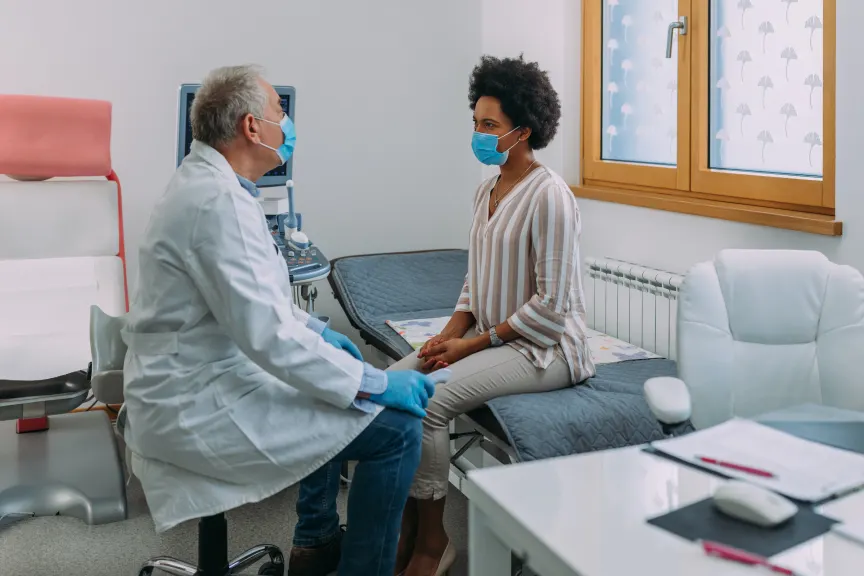黑人社区的慢性护理差异
HealthCentral的全国医疗保健差异调查驱使回家,即在接受质量,色盲治疗方面的看法与行动一样重要。
如果您不这样做活着,您可能看不到它。但是医疗保健中的系统性种族主义是真实的。如果您是一个患有慢性病的黑人患者,那么您比白人同行更有可能遇到难以获得常规后续测试或拒绝进行必要治疗的麻烦。同时,如果您是黑人医生,那么与白人医生的白人患者相比,您的白人患者对您提供的护理不满意的可能性高三倍。
这是补救健康媒体进行的全国性调查中发现的现实,该调查在美国慢性护理和种族差异的状况电子竞技赌钱的软件between quality of care and a person’s race. Some challenges are systemic, the remnants of attitudes and beliefs that society is working to change. Others are less tangible—perceptions and misconceptions that require a different kind of medicine to heal. Here’s what we learned about the ways race impacts the outcome of chronic care.
诊断可能较慢
When you’re sick, you want answers. Every day that drags by is another day without treatment. So when the Remedy Health Media survey found that one out of every four Black people with a chronic condition experienced a fairly slow or very slow path to diagnosis, red flags were raised. But context is also important—and the same number of white patients (25%) also reported experiencing a slow diagnostic process.
有什么不同?这reasonpeople believed their diagnosis was delayed. More than one in three Black patients attributed the delay to their personal characteristics (race, ethnicity, age, weight, or gender)—a rate triple that of white patients. Moreover, of that group, nearly one in two (45.5%) African Americans said their race was the primary reason for their slow diagnosis, compared with just 2.7% of white people.
Of course, a survey alone cannot definitively prove that race is at the root of a delayed diagnosis—and it’s worth noting that 50% of respondents felt it was the complicated nature of their disease that caused their diagnosis delay (here, Blacks and whites were evenly represented). But the fact that a large number of Black Americans with chronic conditions believe the color of their skin is an impediment to care points to another host of challenges: A perception of racially biased care leads to a deeper mistrust of the healthcare system, and that mistrust may mean patients are less likely to seek help. In fact, the Remedy Health Media survey also found that Black patients of white doctors were more than three times as likely as white patients to put off making an appointment because they didn’t trust the healthcare system.
It’s a scenario board-certified physician Vonne Jones, M.D., who provides obstetric and gynecological care to women at Total Women’s Care in Houston, TX, has seen play out in real time. “From physician distrust to delayed access, African Americans do not seek care when warranted until later due to many factors,” says Dr. Jones. This leads to “worsening diagnosis requiring medications or other interventions, increased morbidity, and mortality.”
Economics Take a Toll
缓慢的诊断仍然比没有诊断要好,这是补救健康媒体调查中四分之一的受访者的结果,他们承认由于费用而推迟了必要的医疗任命。电子竞技赌钱的软件对于黑人,亚洲人,西班牙裔和混合种族的黑人,这个数字增加到三分之一。此外,有36%的黑人在患有慢性条件的黑人中引用了财务状况,这是获得所需的护理质量的障碍。
That dovetails with a report from to the Kaiser Family Foundation which found that the average U.S. family spends $8,200 annually on health care costs. When you consider that 29% of Black households earn less than $25,000 a year and another 25% earn between $25,000 and $49,000, according to the U.S. Census data, the conflict between cost of care and cost of living is clear. (No surprise, more than half of the 3,000 survey respondents in the Remedy Health Media survey said dealing with treatment for their chronic condition has negatively impacted their personal finances.)
这bottom line: Regardless of race, low income presents a major barrier to receiving chronic care in the U.S., and those who do get treatment for their condition find their financial situation even more compromised.
基于种族的治疗不信任仍然存在
长期以来,黑人美国人与美国医疗保健系统之间的关系一直是一种困扰。许多人指出了Tuskegee的实验试验以及对黑人参与者的高度不道德待遇,包括预扣挽救生命的药物,这表明医疗保健系统无法受到信任。无论前进如何,都无法否认虐待的遗产。
因此,也许毫不奇怪的是,《补救健康调查》发现黑人患者比白人患者不信任医疗保健系统(14%vs 8%)的可能性几乎是白人患者的两倍。总部位于达拉斯的内科专家梅根·科内利(Megan Conoley)同意,这是很难克服的过去。她说:“对医疗保健系统的不信任已被世代相传。”“在奴隶制和吉姆·克劳时代的黑人进行了恐怖的虐待 - 医疗实验,没有麻醉的程序,过失的护理等等。”科内利博士说,那些经历过这种虐待的人告诉他们的孩子,他们告诉他们的孩子,他们告诉今天的这一代人对该国的医疗体系保持警惕。
可以很方便地说,这种暴行不再存在,世界应该继续前进,但是补救措施的健康媒体调查发现,黑人和亚洲人民比白种人认为他们的提供者对他们的待遇的可能性高六倍,而不是其他种族的患者。电子竞技赌钱的软件调查发现,白人医生的黑人患者更有可能不信任其提供者或扣留信息。
这种不信任可能有助于解释为什么几乎三分之一的黑人调查参与者表示,拥有同一种族的提供者至少有些重要。Conoley博士说:“这通常归结为对共同的文化,共同的经验和更大的整体理解的更大意义。”问题?根据美国医学院协会的数据,只有5%的活跃医生是黑人。由于非洲裔美国人占美国人口的14.2%,这留下了重大的患者身材差距。
This Way Forward
这legacy of mistrust, financial hardship, and delays in medical care is clear—but so is the growing awareness of what must change. There is a public conversation now, where once there was silence. “Awareness of the disparities in care for Black Americans is apparent within pockets of healthcare institutions and providers,” says Dr. Conoley. “This issue needs to be made known diffusely throughout healthcare organizations in the U.S. We need more efforts for white and Black doctors to listen to each other and collaborate on ways to bring about meaningful change.” Since healthcare has shifted to become a business-run industry rather than doctor-led, she points out, executives and administrators should also be included in the discussion about creating a more equitable environment for people of all races.
琼斯博士认为,在您的状况中接受教育并在不满足需要时大声疾呼,但至关重要。她说:“作为非裔美国人,我们需要成为自己的拥护者。”“我们不应该灰心。如果我们不喜欢一位医师告诉我们的内容,请寻求另一种意见。我们还需要意识到我们的家族史,并在出现新症状时试图寻求护理,以确保我们能尽力照顾自己。而且我们不应该延迟获得护理的机会,因为我们害怕可能发生的事情 - 我们必须解决身体症状,尤其是在他们恶化的情况下。”
Dr. Jones maintains the medical community must also step up, first and foremost by learning to better address patient concerns in the Black community. She sees the path forward paved with an increase in the number of African American physicians (by fostering more opportunities, such as mentorships, STEM, and scholarships), greater access to health care, and teaching physicians not only the art of medicine but also the art of building a rapport with patients to allow for the establishment of trust.
与慢性疾病一样,在我们的医疗保健系统中涉及种族差异时没有快速解决。但是,一种经过衡量的,一致的方法有望重塑各种种族的患者和医生如何在为改善健康斗争中融合在一起的情况。
- 家庭护理费用:Kaiser Family Foundation. (2019.) “The Real Cost of Health Care: Interactive Calculator Estimates Both Direct and Hidden Household Spending.”https://www.kff.org/health-costs/press-release/interactive-calculator-estimates-both-direct-and-hidden-household-spending/
- 黑人医生统计:美国医学院协会。(2019年。)“根据种族/种族,所有活跃医师的百分比,2018年。”https://www.aamc.org/data-reports/workforce/interactive-data/figure-18-percentage-all-active-physicians-race/ethnicity-2018
- 非裔美国人的收入:Pew Research Center. (2021.) “Facts About the U.S. Black Population.”https://www.pewresearch.org/social-trends/fact-sheet/facts-about-the-us-black-population/





